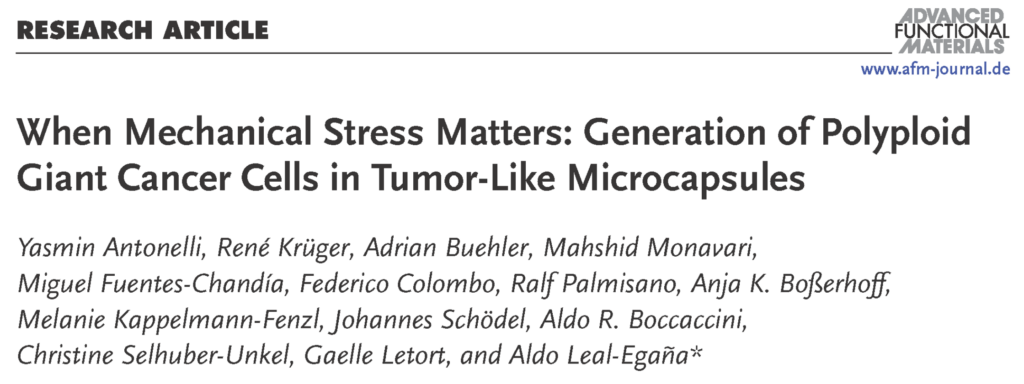A new study published in Advanced Functional Materials marks a significant advance in cancer research and material science. Researchers have embarked on a groundbreaking journey to decode the formation of polyploid giant cancer cells, often detected in tumors due to mechanical stress.

This research into giant polyploid cancer cells highlights the crucial role of mechanical cues in cancer, often overlooked in traditional 2D or 3D cell cultures. By proposing a novel approach of cell confinement and mechanical stress to induce polyploidy and biomechanical diversity, the study suggests that the dynamics of cancer extend beyond the microscopic realms to include mechanical characteristics as label-free biomarkers. This research opens new pathways for therapeutic strategies, emphasizing the environment’s impact on cellular behavior and the potential for targeting the mechanical aspects of cancer progression.
Cancer mechanics: From 2D Cultures to 3D Biological Systems
Our whitepaper, “From single cells to complex 3D environments,” examines the mechanical properties of biological systems, extending from 2D cultures to complex 3D models. Like the study, the whitepaper also emphasizes the mechanical microenvironment’s importance in cancer development. Further, focusing on 2D cultures, 3D spheroids, and polymer-based methods reflects our discussion of the need for precise mechanical testing across various scales. By highlighting the impact of mechanical forces at cellular and tissue levels, it reinforces the significance of understanding mechanical influences in biological research.
As the scientific community unravels these complex interactions, Massimiliano Berardi is poised to bring these insights to a broader audience at the upcoming Mechanobiology Across Scales 2024 conference in Nice, France. Presenting a talk titled “High-Throughput Mechanical Screening in 3D In Vitro Models,” Massimiliano will delve into the practical implications of these findings based on the foundational knowledge in the whitepaper. His session promises to highlight the significance of this research and address discussions on using mechanical screening technologies to advance our understanding and treatment of diseases like cancer and fibrosis.
Mechanobiology Across Scales 2024
Join us on April 2-5, at Laboratoire Jean Alexandre Dieudonné (LJAD). Catch Massimiliano Berardi’s enlightening talk on April 2nd, 17:25-17:35 hrs, and dive into the fusion of mechanical and biological sciences for therapeutic innovation.
Disclaimer for Blog Use:
This blog post discusses the research titled “When Mechanical Stress Matters: Generation of Polyploid Giant Cancer Cells in Tumor-Like Microcapsules,” published in Advanced Functional Materials on February 10, 2024. It simplifies complex scientific findings for general understanding and should not be taken as medical advice. The use of human fetal tissues in research is ethically sensitive and regulated, and the interpretations provided here do not necessarily reflect those of the original authors or their institutions. The content is meant for educational purposes, highlighting advances in neuroscience and regenerative medicine while acknowledging ongoing debates and regulatory considerations. Readers are encouraged to consult the original article for detailed insights and recognize the broader context of this research within the scientific community.



